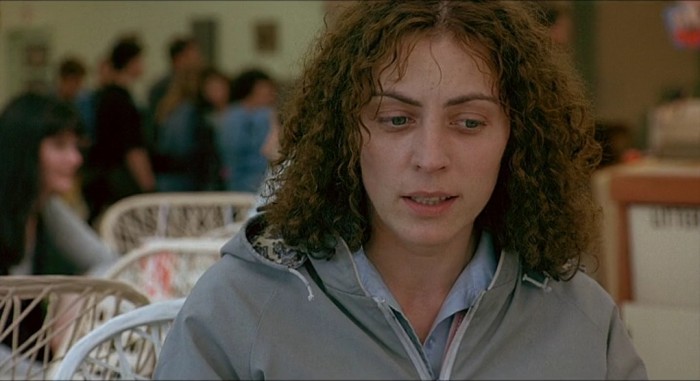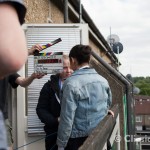By Owen Peters
Directed by Michael Winterbottom
There is something satisfying to being the first: The band you rated when everyone said they were crap, the company shares bought that market investors said leave well alone or the house bought in the wrong postcode, wrong town, wrong county (they said). So, to anyone who saw Butterfly Kiss, the directorial film debut of Michael Winterbottom and writer Frank Cottrell Boyce back in 1995 and spotted a talented pairing for the future: Congratulations. Although I came to the Butterfly Kiss party 20 years late, thank goodness I eventually arrived. This is a little gem.
The film is set around the northern coastline of Lancashire. Winterbottom and Boyce grew up as locals to the area, clearly with a detailed geographical knowledge of the surrounding roads, laybys, petrol stations and woodlands. From the first scene we know there is ‘trouble at’ mill’. A woman is speaking from a prison or remand centre. Her head and shoulders profile is in black and white, shot directly to camera, so, in turn, directly to the film audience. Musical accompaniment: ‘Walking Back to Happiness’ by Helen Shapiro – a nice early touch.
We learn the narrator Miriam (Saskia Reeves) has befriended Eunice (Amanda Plummer) who she meets when Eunice bounds into her petrol station, full of edginess and confrontation, asking for Judith (‘You must be Judith, I’m supposed to meet her here’) and requesting if she knows the following song, assisted by la-la-la’s and arm-waving to an imaginary orchestra. Exactly the same scenario has been played out a couple of miles down the road. On that occasion, Eunice decided to kill the station attendant, due to the fact that she isn’t Judith. The elf-like Eunice is mentally unbalanced, a psychopathic killer, schizophrenic, bisexual, scary, engaging and bouncing along, causing mayhem in her Doc Martin boots – yes, similar to a blind date. There is an instant sexual attraction and tension between the young adults. For Miriam, hooking up with Eunice provides danger, adventure, risks and love. A chance to leave her dead end world behind. The road movie begins.

Winterbottom explores the pair’s sexuality when Miriam takes Eunice back home to meet her mother who is living in a torrid world of dementia. Once naked, Eunice is shown to be heavily tattooed across most orifices and curves. Her bruises are due to and partly hidden by industrial sized chains across her body. Nipple clamps come as additional accessories along with locks on her chains – testimony that she is being punished “’cause I’m bad”. The dominatrix is Eunice, Miriam submissive, accepting her new lover’s wants, needs and moods. To his credit, whilst Winterbottom sets up the scene’s sexuality in graphic detail, he doesn’t keep returning to the lesbian aspect of their relationship. This results in the characters being allowed to grow and develop as the film progresses. A quick kiss is adequate in demonstrating their respective feelings for each other.
On the local highways and byways they cadge lifts, or steal cars and lorries. Most of the good Samaritans they encounter end up dying under the twosome’s brutal hands. Each of the incidents is explained through the narrative of Miriam who has become infatuated with Eunice and has decided she will do anything for her. “I want to show you I love you,” she announces.
The film offers no background as to how and why Eunice is trying to track down her beloved Judith. Who is Judith? Does she exist? Or is she the biblical character referenced and often quoted? “I’ve been up and down these roads looking for love. If you don’t have love, you end up killing someone, if it’s only yourself” she muses in one scene. There is no involvement from police, ambulance services, social workers, friends. The film’s worst expletive is ‘shit’ (once). There isn’t any psychological profiling, or third party justification. The film is without baggage and all the better for its clear, direct storyline.
As they continue their murderous road trip, Miriam offers more insight to the murderous carnage they leave behind: “He was unlucky, just in the wrong place at the wrong time”; “He was a pervert and deserved to die”; “Killing children, now that’s really bad”; “She did bad things but was always trying to do good”; Plummer, shouts, yells, screams (but never cries), accompanied with tics and rapid blinking. She’s always striding off without purpose into cul-de-sacs of murder and violence. She brings a rawness and energy to her character which is totally believable but also empathetic. Can the bad Eunice can become good? Her intensity of character is reminiscent of David Thewlis’ portrayal of Johnny in Mike Leigh’s Naked (1993).

Reeves provides a calm amongst the madness, going along with any instruction without fuss or debate – an innocent bystander, allowing her life to become choreographed by a killer’s insanity. On camera she says with a smile, “We’ve all wanted to pull the train’s emergency cord, or smash the fire glass, drive off from the petrol station. Eunice just does it. She doesn’t care.”
This is indicative of Boyce’s expansive script and street wise banter. He scatters meaningful poetic and biblical quotes into the script like small incendiary devices waiting to explode. His humour falls into pathos, none more so than when Miriam explains how people’s horoscope signs need to feed off each other or they die. Fire and water, yin and yang. Miriam, in narrative mode, when seeing her first dead person in the boot of their stolen car comments, “Yes I was surprised, but I wasn’t happy”, delivered as though she had just found supermarket meat which should have been refrigerated – a bit disappointed but nothing too serious. But seasons and love don’t last. On a deserted beach under a star lit sky, Eunice tells Miriam that if her love is true then will she would do the one thing she really wants, something which will make her happy. Miriam agrees, “Honest I will, “˜cause I love you.”
Even the choice of music complements the film’s aura. A soundtrack of Bjork and The Cranberries serves as a welcome cinematic backdrop to the panoramic dawn to dusk views of the Lancashire and Cumbria coast line.
Over the next two decades, Winterbottom and Boyce collaborated on films and screenplays which have gained them worldwide acclaim: Welcome to Sarajevo, Wonderland, 24 Hour Party People, A Cock and Bull Story, The Trip. Arguably the best of the bunch by a murderess’ mile is Butterfly Kiss. Don’t look for deep and meaningful, or tightly packaged explanations. Accept you saw the partnership: raw, hungry and talented, with murder on the minds.
p.s. If you watch the film and ponder where you have seen Plummer before, here’s a clue: Honey Bunny says – “Any of you fucking pricks move, and I’ll execute every motherfucking last one of ya!”
Watch Butterfly Kiss on FilmDoo.com. (UK & Ireland only)








